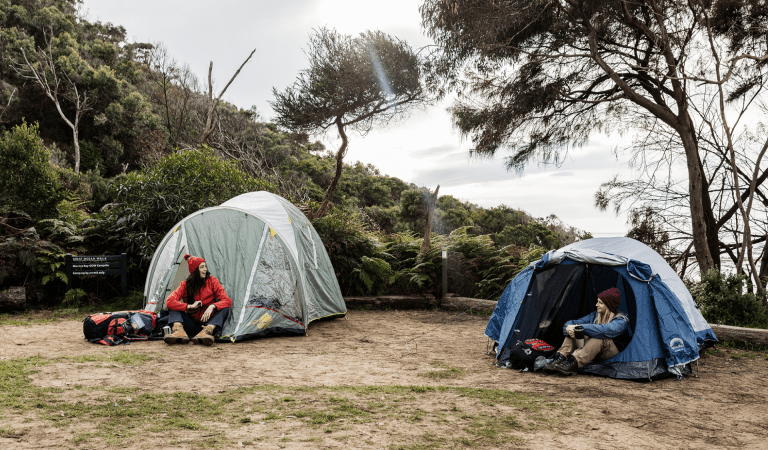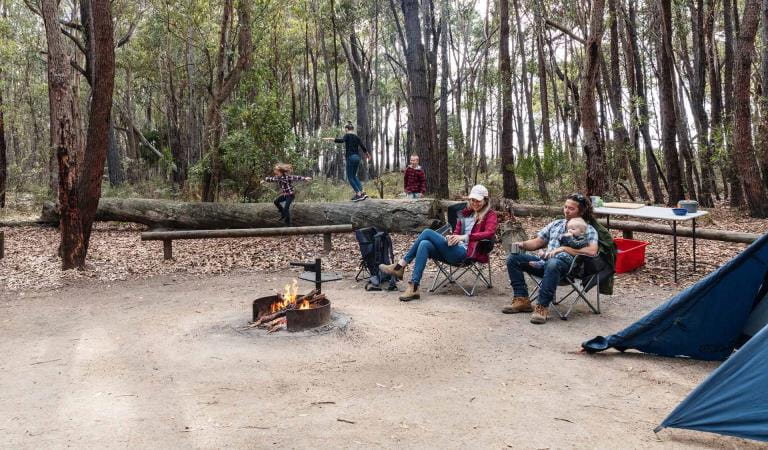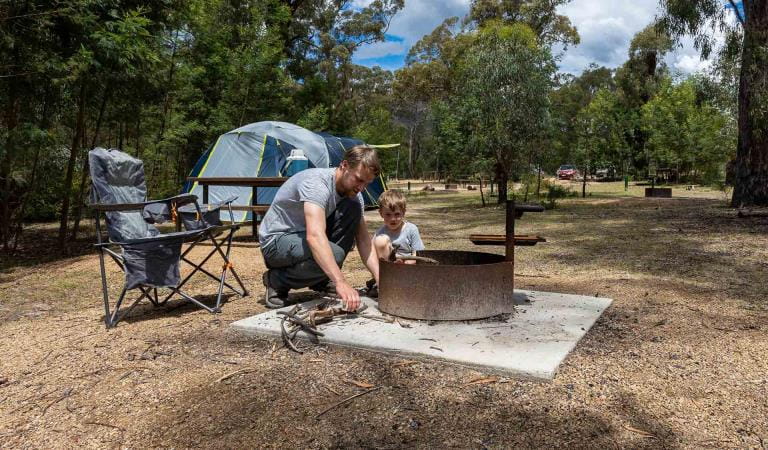Top tips for your first camping trip
Whether you’re looking for adventure, relaxation or both, camping is an excellent getaway option for people of all ages and stages – all you need is an open mind and a willingness to learn the basics.
First-timers should know there will most certainly be challenges, but most will agree, the enjoyment of camping far surpasses the challenges you might face.
Camping offers an opportunity to slow down, be surrounded by nature and truly connect with loved ones, boosting your health and wellbeing in the process. There are so many more reasons to go camping.
If this sounds appealing but you’re not sure where to begin, here are some important things to know when planning your first camping trip.
Book ahead
Booking a campsite before you go will ensure you have basic amenities such as a car spot nearby and a place to pitch your tent. For even more convenience, you’ll be able to choose a campsite that offers running water, a barbecue, picnic table or shared bathrooms. Booking in advance also means you won’t miss out during busy periods.
Stay close to home
Choose a campsite within an hour or so drive from home for your first time. Not only will you have one less thing to worry about before setting out, but if something goes wrong or you forget something, it won’t be such a big deal to turn back mid-trip. We’re building more campgrounds, and upgrading existing ones, right across Victoria as part of the Victoria’s Great Outdoor program so there’s sure to be one near you.
Keep it short
Like when trying anything new, you should view your first camping trip as a practice run where the aim is to simply get a feel for it. A couple of weekdays or a weekend is a good timeframe to learn how to prepare, pack, set up, pack up, and of course enjoy the wonders of camping.
Invest in the essentials
The most important items to pack are food, water and a good quality tent that will hold up under tough conditions such as torrential rains or strong winds. Lighting, cooking equipment, sleeping gear and fire materials are also essential items you won’t be able to camp without. View our packing checklist to be sure you’ll have everything you’ll need.
Consider your home comforts
Beyond the camping essentials, you might want to consider packing some comfort items that will make your stay in nature more homely. Things such as games, a good book, your favourite snack or pillow can help create this.
Become familiar with your gear
There’s a fair amount of equipment to accumulate before setting out on your first camping trip and each item, whether bought, borrowed or rented, will have its own user manual – or none at all! Have a practice run at home with some of the big-ticket items such as your tent, camping stove and fuel, so you’re not stumbling over everything all at once on day one. Check out our Learn to Camp video series for tips on setting up your tent and building a campfire.
Invite experienced campers along
If you’re lucky to have an experienced camper in your group, you’ll be able to relax a little more, knowing that you can approach them with any problems you might face. You may even want to spend some time going through a list of questions in advance, so they can help with packing and preparing too. Over busy periods, some campgrounds also have campground hosts. These volunteers are a great contact point for any questions you might have.

Know the campground rules
All campgrounds have rules and regulations to keep campers safe and wildlife protected. Once you’ve booked your campsite, read up on the rules before you go. You won’t simply be able to bring along your dog as pets aren’t always permitted, and you’ll need to know the campfire rules – where, how and when to light a fire and extinguish it – to mitigate the risks of bushfires.
Download offline maps
Remote areas that are great for camping aren’t always good for phone reception. In today’s modern world where we rely on our smartphones for everything from entertainment to navigation, it’s worth downloading offline maps onto your phone to avoid the frustration of getting lost. You can download offline maps on Google Maps or use an app like Avenza Maps.
Pack the right clothing
When packing clothing, consider the season’s typical climate but be ready for all conditions. In Victoria, it’s common to experience multiple weather conditions in one day, so don’t forget your wet-weather gear, long layers to equally protect from UV rays and frost, and footwear for multiple activities. Our packing checklist outlines the clothing you might need in more detail.
Pre-plan your meals
You’re going to need lots of food and drink to sustain you for the duration of your trip. So you won’t go hungry, it’s a good idea to plan, and even prepare some of your meals before you go. This not only helps to simplify the camping cooking experience, but shopping for ingredients is easier too. View some of our camping recipe ideas.
Arrive early to set up
There will always be little issues to face and challenges to overcome when camping for the first time. The trickiest part of camping is arguably setting up the campsite, so make sure you arrive during the day and not before your campsite’s check-in time. This way, you can complete all your tasks in plenty of daylight and come nightfall, you’ll be ready to settle in and relax.
Leave no trace
As most campers are nature-lovers, it goes without saying that you’ll need to leave your campsite and surrounds without a trace. Take note how you found the area when you got there and make sure that there are no human signs of litter or destruction. Pack lots of waste bags for rubbish and recycling, and dispose of them when you get home.
Have fun!
When you’re doing anything for the first time, there’s a lot to think about, but don’t let the details overwhelm you. Camping is a brilliant pastime to teach you how to slow down and let go of stress. By all means, research lots, prepare thoroughly and practise a little, but don’t forget to enjoy the beauty, simplicity and adventure of your first camping trip.




